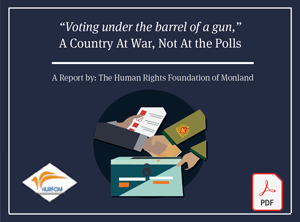Local law courts biased towards government staff, says Mudon Township defendant
July 14, 2015
A defendant in Yindao Village, Mudon Township, has raised questions over the impartiality of local judicial processes, following a legal dispute between himself and the village’s headman.
On October 1, 2014, Mehm Chan Chan, a resident of Yindao village, came into conflict with the village’s headman over a village committee matter. In this instance, Mehm Chan Chan openly disputed a decision made by the Township authorities, claiming it to be unjust. Subsequent to the dispute, Mehm Chan Chan was charged under Section 332 of the Penal Code, which condemns actions that disturb a public servant’s duties.
Nine months later, Mehm Chan Chan’s case is still in court, with, he alleges, little hope of a just resolution. According to Mehm Chan Chan, proceedings have been unjust because the case involves government personnel, and so the police have influenced proceedings to ensure an outcome in the village headman’s favour. While the Judge is understood to support Mehm Chan Chan, he has said that there is very little he can do to resist local police forces’ intervention in the case.
In particular, Mehm Chan Chan has raised concerns over the court’s selection of witnesses, explaining that the court has called people with no relation to the case to testify against him. He detailed, “I go to court once a week. When I go, they call two witnesses [to speak on Mehm Chan Chan’s side of the case], but sometimes those two witnesses are absent. Sometimes only one witness shows up. The village leader has 20 witnesses [on his side]”.
Notably, the court has called six government staff, one police officer and a medic to testify in the village headman’s favour. According to the defendant, the inclusion of a medic amongst the witnesses was particularly surprising, given that no physical injuries were obtained in the dispute. Despite having initially confirmed to Mehm Chan Chan’s lawyer that no injuries were involved, the medic in question has since testified to a physical attack on the village leader. Mehm Chan Chan suspects that the medic was pressured into changing his story.
Mehm Chan Chan also alleges that the police have put pressure on him personally to testify in their favour. He was arrested following his deposition, where he testified against claims made by the police. He attributes this arrest to the fact that the police did not get the answers they wanted from him initially and hoped to intimidate him into changing his story at later stages of the proceedings.
Mehm Chan Chan said, “I asked my lawyer. He said that [the Township authorities] will do whatever they can to win the case because they are government staff. They think that it doesn’t matter if I lose [the case] because I am an ordinary person. I will just go to jail. That’s why they tell the media, journalists and video journalists not to record anything in court. They are really afraid of this because they know that they are doing something wrong”.
He continued, “They will do whatever they can to defeat us. They will find a way to defeat us. They are government staff. How they handle this case is unjust in many ways […] It seems there is no way we will win the case. I think I will be sent to jail for three months”.
Given clear police influence on local-level justice, the Judge for the case has suggested that Mehm Chan Chan bring his dispute to the State-level courts. However, Mehm Chan Chan has stated that he would like to avoid this outcome.
Mehm Chan Chan’s case is a clear example of the weak rule of law that currently exists in Burma. At present, the law does not sufficiently protect the country’s citizens from injustice, failing to leave space for citizens to disagree with government staff without risking arrest, biased legal proceedings and even a jail sentence.
Comments
Got something to say?
You must be logged in to post a comment.




















































